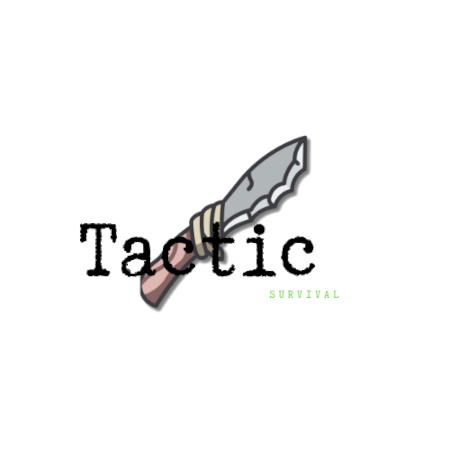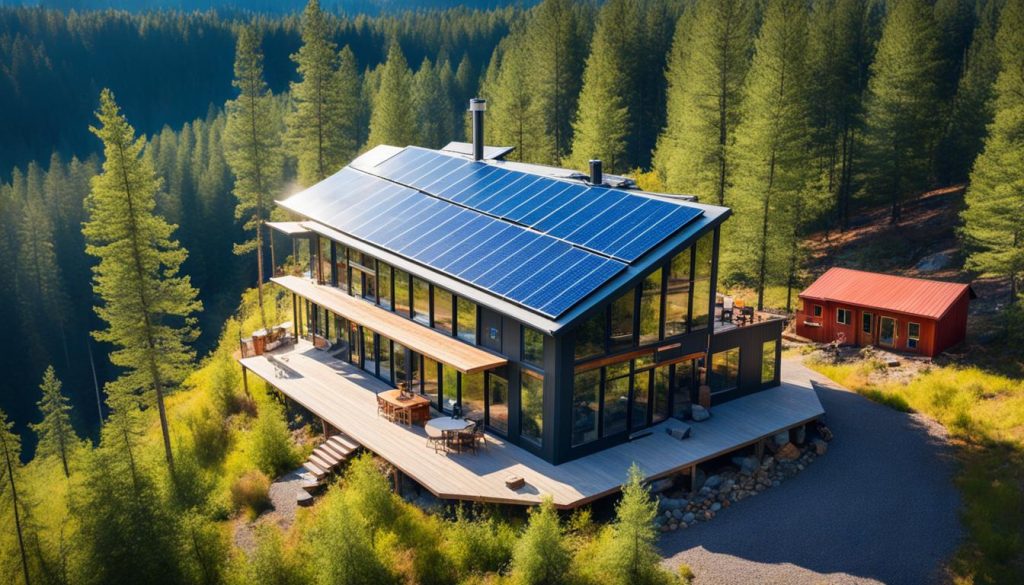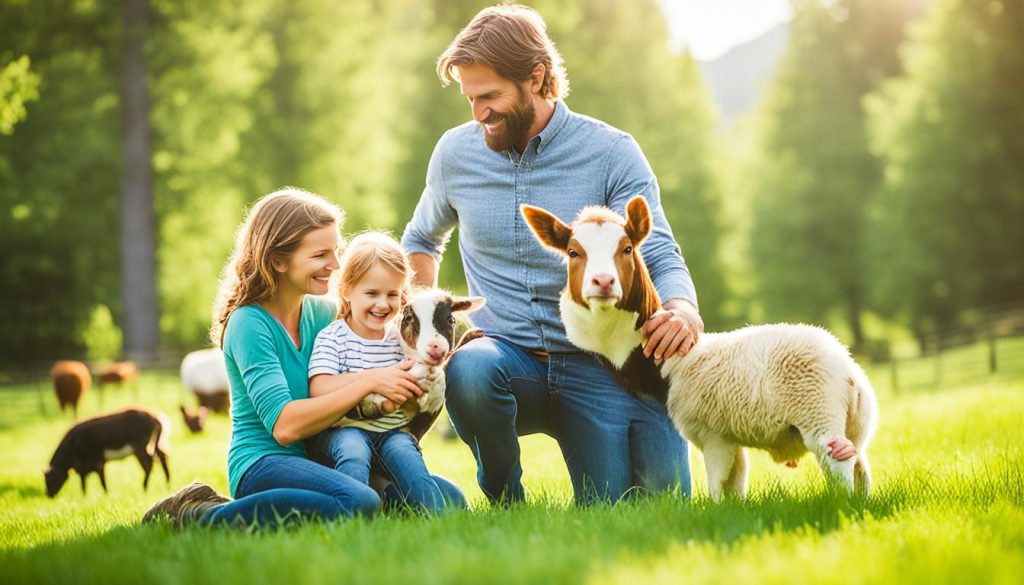Did you know that by 2027, more than 10% of American households will be living off the grid?
Living off the grid means cutting ties with traditional utilities like power and water. It’s all about being more self-sufficient and environmentally friendly. People who choose this path usually have homes that run on their own power sources and find their own water. They also grow a lot of their own food.
Thinking about off-grid living? There are many educational opportunities out there that can help. From courses to workshops, these resources can show you how to live more independently. They cover everything you need to know to start your off-grid journey.
Key Takeaways:
- Off-grid living is about being self-sufficient and living sustainably.
- By 2027, over 10% of U.S. homes are expected to be off the grid.
- It means not relying on the usual power, water, and internet systems.
- Producing your own food and not depending on stores is key.
- There are many classes and programs that teach how to live off the grid.
What You Need to Be Self-Sufficient
Living off-grid boosts sustainable living. It’s about tackling your needs head-on and needing less from others. Self-sufficiency looks at energy, growing food, and shopping less. This way, people can thrive off the grid happily and sustainably.
Building an Off-Grid Home
First, you need a home that’s both independent and ‘green’. Planning an off-grid house is key. Think about materials, design, and where it’ll be. You can pick from small houses to big log cabins. The aim is to use as little energy as possible. This lets you live with fewer outside needs.
Alternative Energy Sources
Energy is vital for going off-grid. It’s all about using solar, wind, or water power. These ways of making electricity are good for the planet. They cut down your energy bills and your impact on Earth.
Food Production
Being self-sufficient means growing your food. A garden can give you fresh, healthy food. Using smart farming methods helps your garden thrive. You can also look for wild food to add variety and connect with nature.
Reducing Dependence on Stores
It’s also about buying less and making more. Focus on what you really need. Learn to keep food fresh and how to fix things. Being self-sufficient uses less and makes less waste. This makes life better for you and the planet.
Being self-sufficient in all these areas is important for off-grid living. It’s all about taking charge of your life, the things you eat, and what you use. With the right skills and mindset, anyone can choose to live this way. It’s a step towards a more sustainable, happier future.
Building an Off-Grid Home: The Ins and Outs of Energy
Creating your off-grid home offers different choices. You can pick from tiny homes, log cabins, or straw bale houses. Your pick will affect the building cost based on the size and materials.
Off-grid living means making your own water and electricity. Make sure you know the best ways to be self-sufficient. Solar panels and generators are great for power in remote places. They let you live off the main power grids for a sustainable life.
Keeping your home the right temperature is key, no matter the climate. Consider geothermal systems, solar designs, or wood stoves to stay comfy. These choices can help control your home’s interior climate.
Exploring Alternative Energy Courses
Want to learn more about off-grid living and alternative energy? Taking courses is a perfect start. You can find classes on solar, wind, and hydro energy. These courses will teach you how to set up and keep your own eco-friendly energy systems.
Taking these courses means you’ll know all about saving energy and making your home efficient. The experts will teach you lots, giving you the skills to handle your off-grid power. This will help you live sustainably and make wise energy choices.
With what you learn in these courses, you can make the most of your home’s energy use. This way, you can live off-grid at low environmental cost and enjoy the perks of sustainable living.
Growing, Foraging, and Preserving Your Own Food
Living off-grid means being self-reliant in growing and finding food. By starting your garden, looking for wild edibles items, and saving food, you keep your pantry full. This way, you don’t have to rely as much on buying food from stores or big farms.
Gardening is key to making your food. A garden brings you fresh food like fruits and veggies. It can also make you feel good and connected to nature. Even if you live in a tiny place, you can still grow your own food. Doing this helps the planet and cuts down on how much you need store-bought food.
Looking for wild food is another great way to add to what you grow. You can find many plants, mushrooms, and berries outside. It’s important to learn what’s safe to eat. This skill makes your food sources even greater.
Saving food lets you enjoy summer and fall food all year. You can keep fruits and veggies fresh in jars. Pickling can make your food taste different and last longer. Drying lets you store food easily. Plus, fermenting veggies is good for your stomach.
Once you start gardening, finding wild food, and saving it, you build a strong food plan. This plan helps you eat better, do less harm to the earth, and enjoy being in charge of your food.
The Benefits of Growing, Foraging, and Preserving Your Own Food
- Self-sufficiency: Making your own food means you need less from big farms and stores. This gives you more say in what you eat.
- Sustainability: Growing, finding, and saving food helps the planet by using less energy and not needing as much farm-made food.
- Health and Nutrition: Food you grow and find is usually healthier and tastier. You avoid many chemicals found in store foods.
- Connection to Nature: Making your food helps you appreciate the world around you. You get to know more about the plants and animals near you.
- Cost Savings: Doing all these can save you money on your food bill. That means more money for other things in your off-grid life.
Sample Chart: Self-Sufficiency in Food Production Methods
| Food Production Method | Advantages | Challenges |
|---|---|---|
| Gardening | – Fresh, nutritious produce – Control over growing methods and inputs – Sense of fulfillment and connection to nature |
– Weather and pest-related risks – Time and effort-intensive – Seasonal limitations |
| Foraging | – Access to a variety of wild edibles – Free and sustainable food source – Opportunity for outdoor exploration |
– Learning curve for identification and safety – Dependence on seasonality and location – Conservation and ethical considerations |
| Food Preservation | – Extended shelf life of harvested fruits, vegetables, and herbs – Ability to enjoy seasonal flavors throughout the year – Introduction of probiotics through fermentation |
– Initial investment in preserving equipment – Learning and mastering various techniques – Storage space requirements |
Raising Animals for Self-Sufficiency
Raising animals can help you become self-sufficient off the grid. Chickens are great for eggs, but you have more bird choices. Ducks, geese, turkeys, and quail all fit a sustainable life. For dairy and meat, think about cows, goats, sheep, and pigs.
Decide which animals by what you like, how much space you have, and what you want from them. Think about care and food needs. Chickens need little space and care. But cows and pigs need more.
Knowing how to care for animals is key. Learn about the needs and advantages of each species. This keeps them healthy and increases what you get from them. Knowing how to feed, house, and treat your animals is a must.
Livestock can make your off-grid life more self-sufficient. They offer meat, eggs, and dairy. They also help with the land. Animals can fertilize soil and keep pests away.
Here’s a table to show some animals you can raise:
| Animal | Products | Space Requirements |
|---|---|---|
| Chickens | Eggs, Meat | Minimal (chicken coop) |
| Ducks | Eggs, Meat | Water source, Duck house |
| Goats | Milk, Meat | Pasture, Shelter |
| Pigs | Meat | Enclosed space, Shelter |
This table is a starting place. Do your own research and talk to experts. With the right info, raising animals can greatly help your self-sufficiency goals and make your off-grid living more sustainable.
Install Off-Grid Solar Power and Solar Hot Water Systems
Getting energy independent with off-grid living means using solar power. You can meet your electricity needs without relying on the usual power grid. It’s key to know how much power you use to size your system right.
Solar power setups include panels, controllers, batteries, and inverters. Panels take in sunlight and turn it to power. That power is saved in batteries. Controllers help keep your battery in good shape by balancing the charge. Inverters then change the power so it runs your home’s appliances.
The Benefits of Off-Grid Solar Power:
- Sustainable Living: Off-grid solar cuts down on fossil fuel use and lessens your footprint.
- Energy Consumption: Making your own power can slash your energy needs and lower bills.
- Renewable Energy Source: Solar energy is endless and green, giving you steady power.
- Energy Independence: You won’t be affected by grid problems, enjoying freedom from outages.
For your system to work well over time, it needs good setup and upkeep. A pro installer can get your system right and help it last. Keep your panels clean, check the batteries often, and watch your power use to ensure it all goes smoothly.
Along with solar power, consider adding a solar hot water system. It uses the sun to warm water for your home. This choice can lower your energy use even more and cut back on how much you rely on heating in traditional ways.
Both solar power and solar hot water bring you closer to full self-sufficiency. They also help you live a more responsible and eco-friendly life. It’s all about making use of the sun’s energy in smart ways for off-grid living.
| Advantages of Off-Grid Solar Power | Benefits of Solar Hot Water Systems |
|---|---|
| Reduces reliance on traditional power sources | Lower energy consumption and utility bills |
| Greater energy independence | Utilizes abundant and renewable solar energy |
| Environmentally friendly and sustainable | Reduced carbon footprint |
| Protection against power outages | Efficient and clean water heating |
Conclusion
Choosing to live off the grid means you can enjoy life on your terms. It lets you get closer to nature. You have to think about where to live, how to build your home, and where your energy and food come from.
Learning how to live off-grid comes from classes and programs. They teach you everything you need to know. These steps can help you do it well.
Living off-grid isn’t simple, but it has many good sides. It helps the planet and keeps you free from the ways of the world. You can live with real meaning.
Those who live off-grid find special ways to solve problems. For example, one family used just two solar panels to power a whole computer. They used kerosene lamps and candles for light.
Even with challenges, they found ways to keep food cold with a propane fridge. They also washed clothes in creative ways and cooked on a wood stove. They built everything they needed by hand.
Entertainment was not electronic but still fun. They made their own games and enjoyed time together. Their way of life shows you can be happy without the usual conveniences.
In off-grid communities, people create their own energy in different ways. They might use wind, sun, or water to make power. This lets everyone pick what works best for them.


